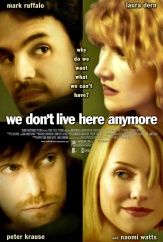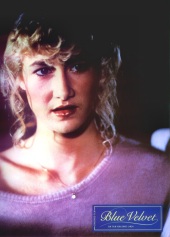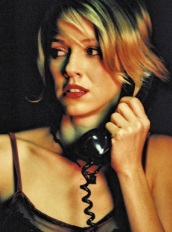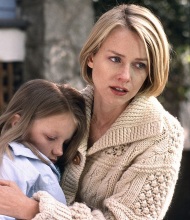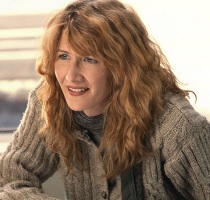| Naomi Watts
Note: This interview contains spoilers for We Don't Live Here Anymore.
Question: What struck you about the script? What were the difficult issues?
Watts: Just that they were difficult themes. These people were so self destructive and so hurtful towards one another. I had a lot of trouble in the beginning even considering doing the project. But I knew I was invested from the moment I read it, because even though I was kind of against a lot of what they were doing to each other, I saw it as being a truth. I know it to be human. John and I would have this ongoing dialogue, and debate it. And I was always saying, “No, no, that's not true.” I realize that was my own viewpoint, but I was still very invested in these conversations. I couldn't say no. So I realized that meant I had to do it, even if it did scare me.
Question: Is it hard to relate to a character who treats adultery this way?
Watts: Yeah. It's such a sensitive subject, but it's something all humans are capable of. Even if they've not experienced it, they've feared it. I was so mad at Edith, because all she needed to do was speak up. She needed to have a big fight with her husband, but who am I to judge? Even though that's not how I would do it, who knows what happened to her before this movie started, before this story started? Why did she become so afraid to voice her needs? What happened there? That's where you start having compassion for these people.
Question: Have you met anyone like the character?
Watts: Yeah. But I don't know anyone that's had this exact story. I know that I've at times bottled my emotions, and I know people who have done that, people afraid of saying what they need and want for fear of alienating someone. We're all capable of that.
AboutFilm: You said that if she'd spoken up, she could have done something to save the marriage.
Watts: Maybe, yeah.
AboutFilm: But, on the other hand, Hank seems like such an empty person inside. At the end of film, you have the last line, a really strong line. Wasn't that her journey, to get to the point where she could leave?
Watts: Subconsciously, but she didn't know that. It wasn't calculated. It was never like, “I'm going to use this to get out of my relationship.” I think she went into that affair with the hope that she could save her marriage, as abstract as that may sound. You sometimes create a crisis to solve a major problem, I think. It can be cleansing. I think that's what she thought she was doing. She's so deadened and so passive, and when she's around Mark [Ruffalo]'s character, you can see her behavior shift, and how she becomes playful again and a bit more spontaneous and confident. That gives her the courage to face what she needs to face.
Question: How would you handle that kind of betrayal in a relationship?
Watts: I don't know. I've never been married, and I've never even had a relationship that long. I certainly would confront it right away. “What are you doing? What am I not giving you?” I mean, you always think that if you were cheated on, your instant need is to run. That's it. It's over. But I think if the relationship—depending on what you've gone through thus far—you will know if that's enough to bind you and to keep you there—to get you through it. Having a child, obviously, is another reason that you have to try and stay in it. That's obviously why she did in the beginning, but then to save not only [herself] but [her] child, she comes to the realization that there is no love anymore. It's done; the betrayal is just too big. I don't know. I would think the first thing I'd want to do is get into some hardcore therapy.
Question: How did the script come your way?
Watts: John Curran is my friend and has been since I don't know, God, for at least twelve years. So he called me and asked me to do it.
Question: Can you tell us about your fart machine?
Watts: Mark Ruffalo, I'm going to kill you! Every interview, he's ahead of me, so he's got the upper hand. It was not my fart machine, for the record. It was the makeup girls' fart machine. I just happened to pull it out a few times. You know, it's an intense subject, and we are on our feet, and it's a low budget film, and we're [snaps fingers] working that fast. Sometimes you've got to break the ice a little bit.
Question: When did you decide to co-produce the film?
Watts: First of all, when John approached me, I was shooting 21 Grams, and I couldn't imagine doing anything that soon after. I actually have this rule that I don't like to read another script while I'm in the midst of shooting, because it's almost like cheating. You're playing the movie, you're so involved and so devoted to your character, and the needs of her and the director and the other actors. To decide to do a movie, it's so much more than just reading the script. You have to really play it all out. “What's this going to do for me in my life? What's the emotional journey?” All those things. So I try not to do it. But because it was my friend, I agreed to.
Then when I read it, I was like, “Mm, I just don't know.” It's too soon, and I had trouble with these people. I knew I couldn't do the character of Terry because she's so external in her emotional journey, and so I thought well, Edith is something I really haven't done before. She's so internal, [while] I always think of myself as being completely boring unless I'm doing something. So I had all that dialogue with John, and then Mark got on the phone with me. I was still on the fence, and then I got asked to be a producer. And I thought, “Well, that's interesting. That's something I really have always wanted to do. It's something I want to really pursue.” Although it wasn't involvement from the ground up, it was very much having a creative voice, and I was there supporting my director and sticking to the artistic integrity of the film. Question: With King Kong coming up, how similar or different will you be from Fay Wray and Jessica Lange?
Watts: Well, Fay Wray is a huge inspiration and so is Jessica Lange. It's a very iconic movie and iconic role, so there's a little bit of fear about that, but also intrigue. Peter Jackson is a genius, and he will make it his own and do something completely different and modernize it, even though it's in set the ‘30s. I think he's got some great ideas, which I'm not at liberty to divulge right now.
Question: Are you prepared to act against nothing, for the CGIs?
Watts: It won't be nothing. That's one of the things he told me in our initial meeting, because I would be very worried about that. Andy Serkis, who played Gollum in Lord of the Rings, is going to be not only a character in the film, but he's going to be a pair of eyes for me to look at. There's a huge amount of emotion, looking at a… [trails off]
Question: When do you start shooting?
Watts: September.
Question: In New Zealand?
Watts: Mm-hmm.
AboutFilm: You struggled for many years, and then Mulholland Drive and all of these that films we've been talking about. A lot of success, very suddenly, very fast. How have you managed that? How has that changed your life, other than in the obvious ways?
Watts: Well, I'm in it and I'm just functioning. With every problem solved, a new one opens up and it's not like, “Oh wow, okay, now I can just rest on my laurels.” Life has changed a little bit. The phone rings a little bit more, and the schedule is a lot tighter, but I'm getting invited to work with some of the best, the people that I've always admired. Now there's a pressure of making the right decisions and not being a flash in the pan—to try to extrapolate that into something bigger.
Question: How important is it to do movies like King Kong and then do smaller films like 21 Grams and We Don't Live Here Anymore?
Watts: Look, it's never a calculated conscious— I read a script, and I fall in love or I don't. A lot of it has to do with the director, the part, and the people who are doing it with you. I don't say to myself, “Oh, this is my empire, and I need to do commercial stuff, because that's money in the bank and that creates—” Sure, you want to balance but that's about the roles, I think, and your commitment and devotion to each character is always the same no matter what the scale of the movie.
Question: Is it hard to find scripts like We Don't Live Here Anymore?
Watts: Yeah, I think so, but I think it could be changing a little bit. I feel a bit optimistic about what's going on today in the films that people are embracing. I think we're maybe entering into a new period. We need a little bit more. This, to me, reminds me of a film in the ‘70s. It's very much echoing that period, I think—films like Carnal Knowledge, The Conversation, and Bob and Carol and Ted and Alice.
Question: You have done some interesting sex scenes. What do you think about sex in film?
Watts: Well, to me, the films I do are usually about people and relationships, and it's just another part of— Love is connected to sex. I don't think I've ever done a sex scene when it's just purely sexual. It's usually layered with a huge amount of subtext. I don't think I could do it if it wasn't. It's not just like, “Whoah, I'm fucking horny.” It's about, like in 21 Grams, it was so emotional and sad. And in this movie, you've got the silly frivolous moment at the tree, and then you've got the desperate urge of, “Please, this is keeping me alive,” and giving me the courage to live again. So that's how I'm able to reconcile, because it is difficult. It's a very vulnerable thing. That's usually between you and your partner in private, so [it's hard] to open that up. But it is part of the storytelling, so therefore it needs to be done, if it's handled in the right way.
Question: On the personal side, are you involved at the moment?
Watts: [laughs uneasily] Negative.
Question: What are we going to see in The Ring 2? Can you talk about the storyline?
Watts: Dreamworks are very smart about this. Doing a sequel is always hard. How do you not be repetitive? How do you deliver to your audience that you've found, and you know what they need, but [also] introduce new ideas. I think they've been really careful about that. We have the wanted scares, but they're never cheap shock value moments. They're usually more creepy, and there's more moral dilemmas. I actually feel that the emotional arc is a little stronger. There's less detective work and it's more about, “How do I save my child?”
Question: How nervous were you to do a sequel? It's your first sequel ever, right? The first time you've ever played the same character twice?
Watts: Other than being on a TV series, yeah. It is nerve wracking, because you think, “Well, I've done that. What else can I do?” But there's also something challenging about that too, showing how this person has grown. How do you play these horrible things that she's had to live through?
Question: How has she changed? Is she different in this movie?
Watts: Well, yeah. She is responsible for a lot of death [laughs], and so I think living with a huge thing. But she's trying to be a more caring and responsible mother, and that's how it starts out.
Question: Are we still dealing with the same videotape, or more?
Watts: There's a lot of other ideas that have been introduced but I can't tell you. It's way too early. But it's not just the tape and the phone.
Question: What did you think of Scary Movie 3 making fun of The Ring?
Watts: I didn't see it, but I saw clips of it and I know they had a go. I think that's a compliment, though, right?
Question: Will you work in Australia again?
Watts: Oh, I would love to. I want to.
AboutFilm: Your last Australian project was Ned Kelly, wasn't it ?
Watts: Ned Kelly, yeah.
Question: Do you live in Los Angeles now?
Watts: I just bought a house here, yeah. But I have been living here. You know, in this industry, you're always three months here, two months there.
Question: Would you like to go back?
Watts: Yeah, I want to buy a house there, too, or an apartment. I would love to. It depends when and if the right thing comes up. But I really, really want to, you know—just to be home.
Question: What do you miss about your country?
Watts: Oh my God, so much. I miss the people; I miss the lifestyle; I miss the food.
Question: What's so good about the food?
Watts: Sidney, I'm telling you, the seafood, the fresh produce. It's just clean food. When I say clean, I mean it's fresh and it tastes — You don't have to put a million spices and flavors into it. |
|
Laura Dern
Note: This interview contains spoilers for We Don't Live Here Anymore.
Question: Is it refreshing to receive this kind of script?
Dern: So refreshing. It's a rarity, as you all know, to find material like this. So I feel very, very lucky and privileged.
Question: The character is emotionally on the edge through the whole movie. How hard is that to maintain?
Dern: Luckily I took breaks at nights. But, it's so exciting as an actor to get to explore human nature. I could talk to you for hours about this film, because I'm interested in it. I'm asking the same questions. I want to understand partnership; I want to learn to communicate; I want to hear a man and take in what he has to say, and be heard and define each other for who we are, and not some idea of each other. That's everything this movie is about.
AboutFilm: This was a very tight, hectic production, by the sound of it. How do you do something this emotionally complex and difficult that quickly, without rehearsal?
Dern: It's weird, you know. It's a great challenge, and seemingly very hard work, and a really great luxury. You have both working for you. There isn't time. And sometimes—especially for Mark and I in the long, eight page scenes—our fights were rather endless and needed to feel long and redundant and painful, like, “Oh my God, they're fighting again.” So you wanted to hold that feeling, but, because there was so much language, it was sort of like working on a play. A lot of it was done in a master. So we'd come in and have that to tackle. And yet, probably the rawness of rehearsing on film offered us a great luxury, too. So it works both ways. We had to think on our feet and got lucky when it worked because the camera was rolling.
AboutFilm: Do you feel that this movie has given you some insight or taught you something that you didn't know?
Dern: You know, I think ultimately the only thing I can concretely take from it is that the investment has to be within yourself in any partnership. If you're doing it because of an idea, or because it feels good in the moment, or because you want to be faithful for someone else, you're going to be lost. I think that's part of Terry's journey. She has to find her own voice for herself. She can't define for [Jack] what he needs in a marriage or in a woman. She can't define in this marriage whether or not there's going to be fidelity. She can choose to leave it. She can choose to stay in it. She can choose to try to help him relieve his own guilt by walking into an affair, and somehow trying to become [like] Hank by believing, “Hey this is just what we do, and it's open marriage.”
She's just none of those things. None of those things would ever work for Terry. She's too authentic; she's too direct. And so she discovers her voice in all the misguided attempts that she makes, and having walked through a lot of rage, and inebriation with alcohol, and obsessive compulsive behavior. She tries out everything to try to get to what is right for her. I like that. Not only is the character morally ambiguous, but the film is too. It doesn't define for you that there's a right or wrong, or that one character is the villain, and one is the hero. It's a complicated question. Any movie that has that point of view is exciting to me. Question: Does that mean your character understands also the husband's point of view?
Dern: Do I understand what he's doing? I don't think I understand it, no. I think I try to, but I don't think Terry's capable of that.
Question: But you accept it, in the end.
Dern: I accept that it happened, and I choose to move on, yeah. But I think that if the affair continued, the marriage would be over. She has a very clear definition of herself about what she can live with, and what she can't. Can she live knowing that he has betrayed her? She's gonna try. Whether it lasts three weeks or another twenty years, I don't know. But I know that she's gonna be clear with him, and I know that she's gonna use her voice. And I think that he's someone who's discovered who she really is, instead of the idea of her, and maybe it will redefine a new sense of love for her than he had before
But there is no question that Terry is not someone who will stand for infidelity. And that's an interesting question, too, that we all address, which is when it has happened, what can you live with, and what can you not live with. Many of us have been more than one person in this film, which is difficult to think about, but we've played different roles, and we've tried on different things. I don't know, I feel like the relationship I'm in now— As jealous as one can be about our partner's past or even our own [ laughs ]— It's like you want to be the pristine virgins for each other. But, thank God, you walk through a path that teaches you what you don't deserve, as much as what you want to let into your life. Sometimes it takes all that crap to find your way.
Question: Is your partner someone we would know?
Dern: He's a musician named Ben Harper. And I love and admire him very much.
Question: How long have you been together?
Dern: Four years.
Question: Any plans to get married?
Dern: We're formally engaged, and we call each other “husband and wife” because we merely haven't done the ceremony because of schedule. But we're well into a family together. We have one child and on our way to a second. We're very much partners.
Question: When you say “on your way”—?
Dern: I'm pregnant, yeah.
Question: When are you expecting?
Dern: Not until the end of the year.
Question: Are you going to work between now and then?
Dern: I just finished a movie for Don Roos, and I'm doing a cameo in a movie of a friend of mine, Jane Anderson, based on a book, The Prizewinner of Defiance Ohio, in a couple of weeks. I'm just back to work, and so passionate about working and so excited about working, because I had taken some time off with the baby. I took a lot of time off with my first baby for a lot of personal reasons, and it was really right for us… I was going to do a movie I really love, but I'm going to be too pregnant to do it now, so that's heartbreaking, but totally worth it [laughs]. But [another] film I want to do is going shortly after the beginning of the year. I think this time it will be a different experience of taking the baby on the road and trying to do it all at the same time. That will be interesting.
Question: What film is that?
Dern: I guess I shouldn't talk about it yet, but it's a really daring, interesting movie that deals with a civil rights story in the ‘60s.
Question: Is it based on a true story?
Dern: Based partly on truth, and partly on very irreverent satire fiction.
Question: Who's your character?
Dern: She's actually a wife. You think she's one thing, and she's very much the opposite. I always like to [drums hands on table] play people who are full of surprises.
Question: What kind of scripts do you look for?
Dern: I'm interested in flawed protagonists. I was raised on them. My parents acted [so] when I was a child, I grew up on the films they were working on in the ‘70s. And that was all that was being made. Certainly throughout Europe and South America, the rest of the world seems to embrace that ideology, but it's not really the American pastime. We like our archetypes and heroes to be what they are at face value. Life doesn't work out like that. [But] I think [with] the current political climate, and given that tragically we're in wartime—all of those things combined may make filmmakers turn more and more towards the truth now. Whatever grand turn that takes, I think it's an exciting time, potentially, in the arts.
Question: You did a lot of TV projects. Did that mean that you were frustrated at one point with scripts for feature films? Is that why you went to TV?
Dern: Never consistently. I just go where's there's interesting material. I did Jurassic Park, and then Afterburn for HBO, because it's a movie that would have been a feature in the ‘70s, a true story about a woman who sued the US military. That wouldn't be a feature [today]. Maybe it would now after Fahrenheit 9/11. But I think I'll continue to go back and forth. A lot of actors are doing television series who you would never have imagined on television because some of the greatest parts—
Peter Krause is an example. James Gandolfini, what an incredible part. How could you dream of some of those scenes on The Sopranos? Some of the greatest acting you could see! [BBC America's] The Office is the best acting I've seen in years. It's brilliant. It's absolute genius. Those two seasons are the best movie I've seen in many, many years, and just so sad [that] you can't believe you're laughing. It's just so heartbreaking. So that's exciting, because it is raw, ugly and dark, just like some of HBO. A lot of the true stories, Norma Rae, and China Syndrome, and Silkwood would now be cable movies. I'll just go wherever I get to be a part of something like that.
Two years ago, I did a film for Showtime about the travesty of HMOs. Showtime was incredible, and I really commend the then-president, Jerry Offsay, because throughout the film, I just completely destroyed Kaiser Permanente by name. The lawyers went crazy, and we were on CNN, and there was lots of controversy. They never shied away for one second. I don't think a film company would do that, would be that brave. They took them on—wrongful death—totally bludgeoned them as a responsible party. It was called Damaged Care. It was based on a true story of a doctor who once worked for the HMOs, and then helped people testify against them. It's just an unbelievable story as you start to learn more about what's going on in that remarkable health system we have here in the US of A [laughs]. You want healthcare, come on down! [laughs] But, how great that there's some place where you can tell a story like that and not have a lawyer say, “Sorry, can we just change the name?” That's the whole point. So it's exciting.
AboutFilm: Do you think you'll ever work with David Lynch again?
Dern: I do. I have firm conviction that I will probably a few more times in my life. I feel like that with him more than anybody. And I'm currently experimenting with him on a project that he's playing around with using DV [digital video], so that he has the liberty to do whatever he wants at any given time.
Question: What's it like working with David Lynch?
Dern: It's incredible. It's absolutely incredible. I don't think I could play any of the parts I've played—since Wild at Heart particularly—without the luxury of having him as a friend and as a supporter, [so] that I [can] do something far beyond what I thought I could do, in terms of being boundary-less in a character. It's one thing to feel boundary-less emotionally, but with David, there are no boundaries even in the story. There's no place you can't go, without the extreme feeling comfortable to him. I think it's the best place for an actor to be educated, to try everything.
AboutFilm: I had the pleasure of meeting your father at the Monster junket. Is he always that much of a storyteller at family gatherings? Have you heard all the stories?
Dern: Not all of them. There are so many. It just keeps going. He's unbelievable, isn't he?
AboutFilm: We could just listen to him for hours. All we did was turn on our recorders, and twenty minutes later—
Dern: He's so entertaining, it's incredible. And he's lived it. It's really incredible. And he's quite brilliant. That's the other thing that's so interesting. He has this unbelievable memory, and he knows something about everything, it seems.
Question: Are you going to be in the fourth Jurassic Park?
Dern: Not yet, is it going?
Question: We don't know. People keep telling us it's going to be completely different.
Dern: I wonder who will direct it. I wonder if dinosaurs will be in it. [laughs] The dinosaurs are in the White House!
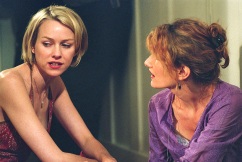
Naomi Watts and Laura Dern star in We Don't Live Here Anymore. |
|
